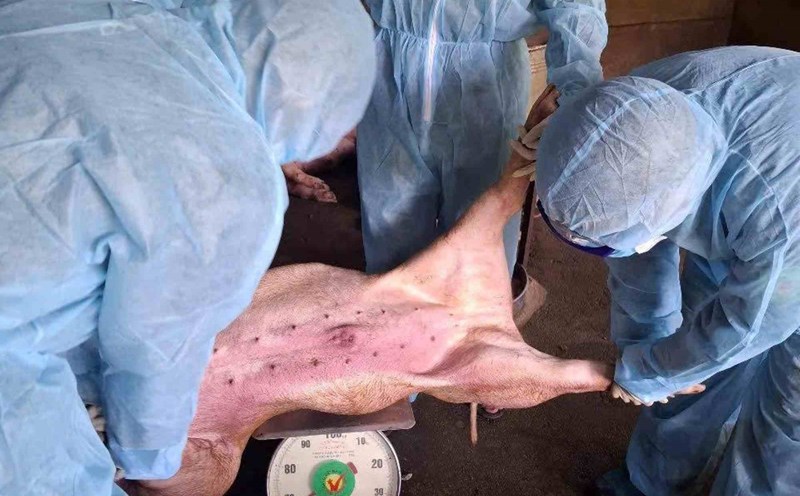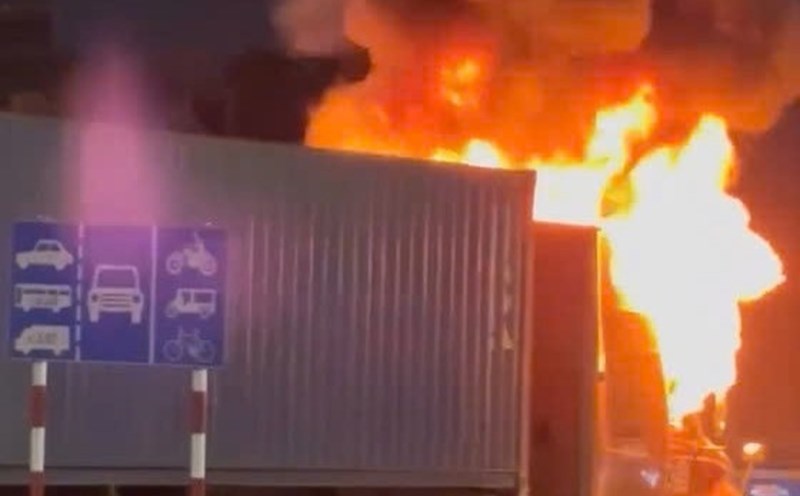Lack of vaccines, lack of human resources
In early August 2025, on the Dong Truong Son route (Phuoc Tra commune, Da Nang city), Mr. Huynh Tan T. was discovered carrying two pigs with signs of African swine fever, no quarantine papers, on his way to the Tra Doc mountainous area for consumption. Despite being carefully disguised with leaves, Mr. T. was still discovered by the commune's interdisciplinary inspection force, who made a record and destroyed all the pigs.
The case once again shows the lax control of animal transportation, especially in border areas, which is a major threat in the context of the outbreak of African swine fever in many localities of Da Nang.
In Xuan Phu commune - which used to be a "hot spot" for epidemics, in less than 20 days, 26/27 villages have had outbreaks. More than 1,000 pigs, equivalent to more than 80 tons of meat, were destroyed. In Son Cam Ha commune, a mountainous locality with strengths in livestock farming, a herd of more than 11,000 pigs is also facing high risk. Mr. Vo Tan Ben's family lost nearly 200 million VND when 70 pigs had to be destroyed in a few days. "I strictly implement sanitation, disinfection, and vaccination measures but still cannot avoid the epidemic," Mr. Ben sadly shared.
According to statistics from the Department of Agriculture of Da Nang City, in July 2025 alone, the epidemic spread to 284 villages and residential blocks in 39 communes and wards with 5,518 pigs destroyed. This figure reflects an alarming reality: the current epidemic prevention system is not strong enough to control the spread.
The reason is pointed out that the total pig herd is large, but is mainly raised in a small-scale household household household model, accounting for about 80%. Most farming households have not strictly applied biosafety measures. Meanwhile, slaughter control still has many shortcomings; the epidemic has existed in the environment for a long time and there is no compulsory vaccine epidemic prevention mechanism.
In particular, after the merger of areas, many communes and wards no longer have specialized veterinary staff, leading to slow detection and handling of outbreaks. According to the city's Department of Agriculture, the current civil service force is only 24 people, not enough to control widely after the merger of the area. Meanwhile, the proposal to provide an epidemic prevention vaccine is still stuck because there are no regulations on mandatory vaccination.
Racing every hour to suppress the epidemic
Despite lack of human resources and funding, localities in Da Nang are making every effort to control the epidemic. The Department of Agriculture has issued nearly 4,700 liters of chemicals, established 2 mobile teams to inspect epidemic prevention, and proposed to establish 4 regional stations, arrange specialized staff to support quarantine and slaughter control. The City People's Committee also agreed to supply chemicals to neighboring communes to prevent the epidemic from spreading.
In Son Cam Ha commune, where there are more than 11,000 pigs - accounting for more than 82% of the total cattle herd of the commune, the epidemic suppression work is being urgently carried out. Local leaders said that local forces and young volunteers worked all night to support people in destroying pigs and spraying disinfectants. At one point, the locality had to destroy 147 pigs of a household, causing a loss of more than 600 million VND - a not-so-small number for livestock farmers.
Some other localities have also proactively arranged funding to purchase equipment, protective gear, and disinfectants, while the treatment of waste and dead pigs is also strictly controlled.
Deputy Director of the Department of Agriculture and Environment Nguyen Xuan Vu affirmed: The entire political system is taking drastic action. People's awareness is a key factor, in addition to support mechanisms, equipment and human resources".
However, a major difficulty still exists: more than 90.5 billion VND in funding to support the destruction of sick pigs in 2021 and 2022, but has not been disbursed yet. This has made many households hesitant, not declaring the epidemic, afraid of not being supported when destroying sick pigs. The Department of Agriculture has proposed that the People's Committee of Da Nang City direct the Department of Finance to advise on funding allocation, and at the same time include the African swine fever vaccine in the mandatory vaccination list from 2026.
According to Mr. Tran Nam Hung - Vice Chairman of Da Nang City People's Committee, the fundamental solution, the most important of which is vaccination. The People's Committee of Da Nang City agreed to vaccinate all pigs against the disease from 2026. Localities and sectors agree to promote and mobilize so that people understand and respond. This will bring many benefits and protect the rights of livestock farmers
Households that are not vaccinated will not enjoy support policies if pigs infected with the disease are forced to be destroyed.











